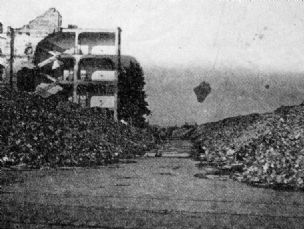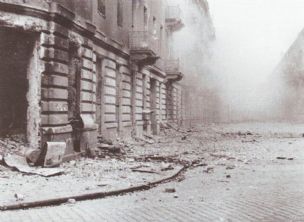A Noble Jewish Prayer in the Midst of the Warsaw Uprising
80 Years since the Warsaw Uprising
By: Yaakov Rosenfeld
Eighty years ago in the month of Elul 5704 (August 1944), a war of destruction took place in Warsaw. This was over a year after the liquidation of the Warsaw Ghetto and the extermination of all the hundreds of thousands of Jews who lived there. The people of the Polish underground prepared for a long time for the uprising, and the signal was given at the beginning of the month of Av.
The results of the uprising were tragic for Warsaw. The city was completely destroyed. The Nazis fought brutally and murdered hundreds of thousands. About eighty-five percent of the buildings in all of Warsaw, the capital, were completely destroyed, among them the museums, the libraries, and all the historical buildings preserved from generation to generation. The direct damages caused by the destruction of the city was then estimated at forty billion dollars. Himmler’s plan was to destroy all of Warsaw and turn it into a lake.
According to estimates, about twenty-five thousand Jews lived in the burning and devastated Warsaw at the time – those with false identities, and those in the underground, in bunkers, and in cellars.

Nowolipki Street after the liquidation of the Warsaw Ghetto
One of these was Ilana Weinreb Levron, a Jewish girl who, along with her friend Irka, took part in the Polish uprising in Warsaw.
Ten years ago, in 2014, seventy years after the uprising, Ilana passed away at an old age.
When she died, Ilana took with her her secrets and the secret of her fellow rebels in perishing Warsaw, but the wonderful diary she wrote, parts of which were published in Yalkut Moreshet about fifty years ago, sheds a little light on this terrible period.
And here is a moving and heart-wrenching passage from Ilana’s testimony, describing an event that happened one dark night, in the midst of the Warsaw Uprising, exactly eighty years ago, at the end of the summer of 5704 (1944):

Warsaw burns
Late in the evening, we went out to the yard to breathe some fresh air, before spending the night in the stuffy cellar. Irka sat down on a broken crate, while I leaned next to her. We pondered our fate.
Suddenly our gaze fell on the silhouette of a man whose face was turned to the wall and his whole body was moving in a strange way.
The darkness, which was almost complete, hindered our orientation.
A few seconds later, it dawned on me: this is a Jew praying Aravit (the evening prayer).
His prayer lasts over a minute and we both sit quietly and with great excitement in the dark, trying not to desecrate this exhalted moment.
I whisper in Irka’s ear: this prayer is called the “eighteen” prayer. I remembered from my grandfather’s house that they say it standing up three times a day – in the morning, in the afternoon, and after sunset. It has eighteen blessings.
Irka suggests that we ask the worshiper if he actually said this prayer and thus let him understand that we are of the same religion as him.
We approach him and ask: “Eighteen?”
He nodded and raised his hands above us to G-d, and blessed us.
For us this blessing was a sign that we would be saved and get through the war in peace.














